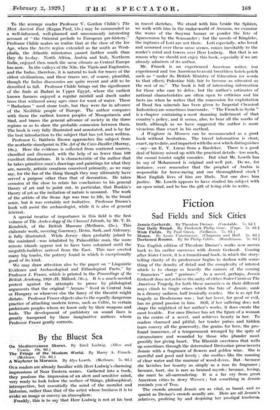By the Bluest Sea
On Mediterranean Shores. By Emil Ludwig. (Allen and Unwin. 10s. 6d.)
The Fringe of the Moslem World. By Harry A. Franck. (Methuen. 12s. 6c1.) A Wayfarer in Morocco. By Alys Lowth. (Methuen. 7s. 6d.)
Ova readers are already familiar with Herr Ludwig's charming impressions of Near Eastern scenes. Gathered into a book, they produce the impression of an alert and sensitive mind, very ready to look below the surface of things, philosophical, introspective, but essentially the mind of the moralist and historian, rather than that of the artist whose business it is to . . _ _ _ evoke an image or convey an atmosphere.
Frankly, this is to say that Herr Ludwig is not at his best in travel- sketches. We stand with him beside the Sphinx, we walk with him in the under-world of Amman, we examine the wares of the Smyrna bazaar or ponder the fate of Agamemnon by the Scamander ; but the moods of Kinglake, the raptures of Loti are not there. Loti especially, who loved and mourned over these same scenes, comes inevitably to the reader's mind and towers over Herr Ludwig. But that is no reason why we should not enjoy this book, especially if we are already admirers of its author.
Mr. Ffanek is an experienced • American writer, too experienced and too American to avoid breathless hotch-potch such as " under its British Ministry of Education (or words to that effect) Palestine bids fair to become as educated as the rest of us." The book is full of interesting information for those who care to delve, but the author's estimates of national characteristics are often open to criticism and his facts (as when he writes that the concession for exploitation of Dead Sea minerals has been given to Imperial Chemical Industries) are sometimes inaccurate. " The French in Syria " is a chapter containing a most damning indictment of that country's policy, and it seems, also, to bear all the marks of truth, although as we have suggested the author is more vivacious than exact in his method.
A Wayfarer in Morocco can be recommended as a good book without hesitation. The travel information is clear, exact, up to date, and imparted with the zest which distinguishes —say—an E. V. Lucas from a Baedeker. There is a good deal of history mixed up with the practical details—too much, the casual tourist might consider. But what Mr. Lowth has to say of Mohammed is original and well put. Do we, for instance, ever remember that the prophet of Arabia is responsible for horse-racing and our thoroughbred stock ? Most English lives of him are libels. Not one does him justice. Mr. Lowth appears to have studied his subject with an open mind, and he has the gift of being able to write.








































 Previous page
Previous page